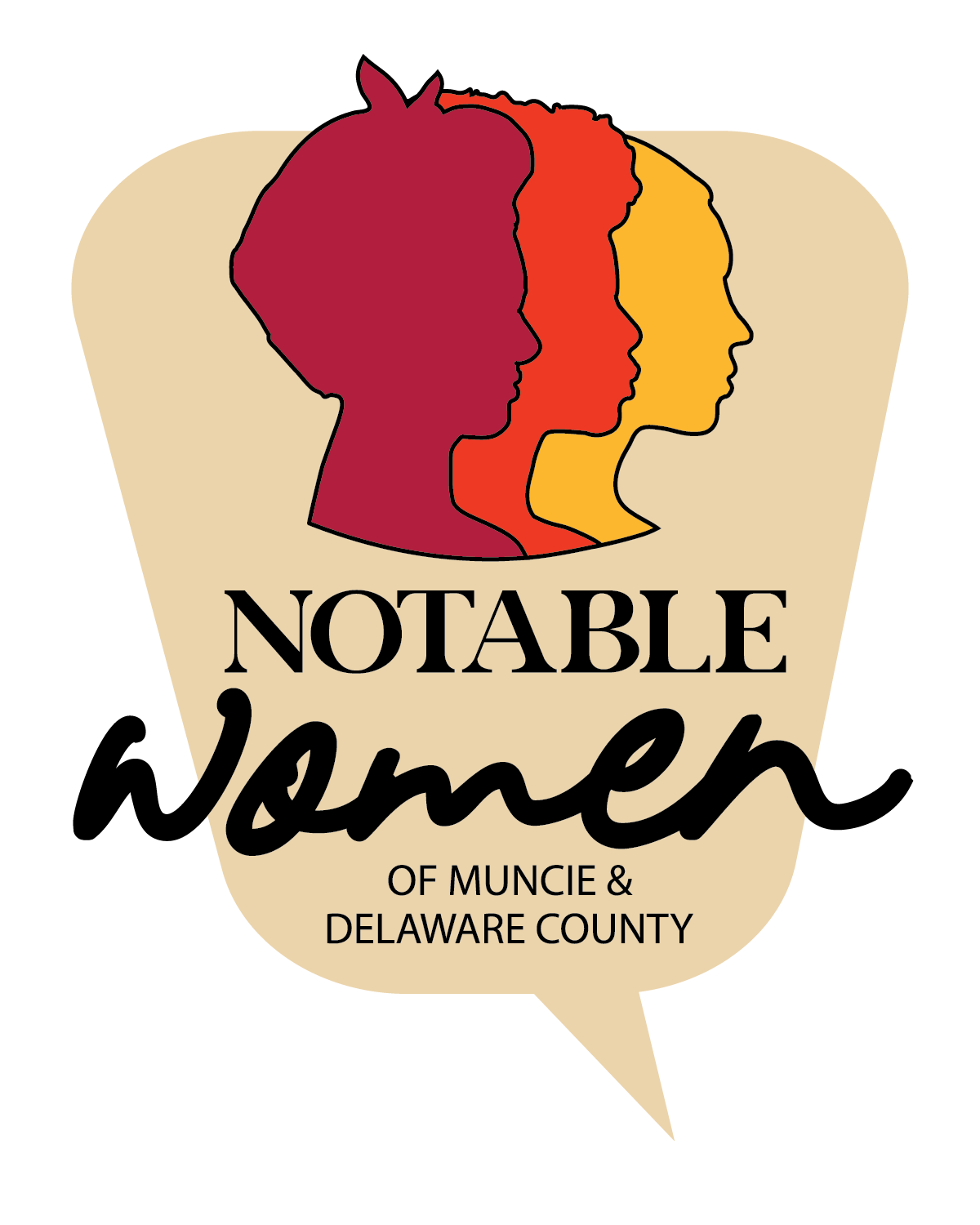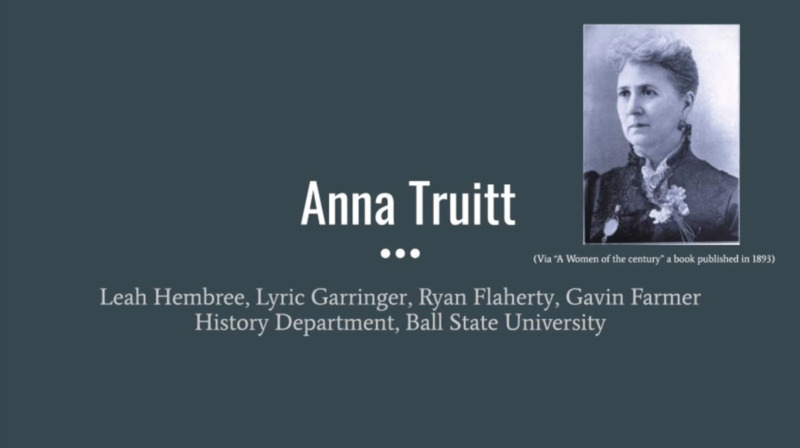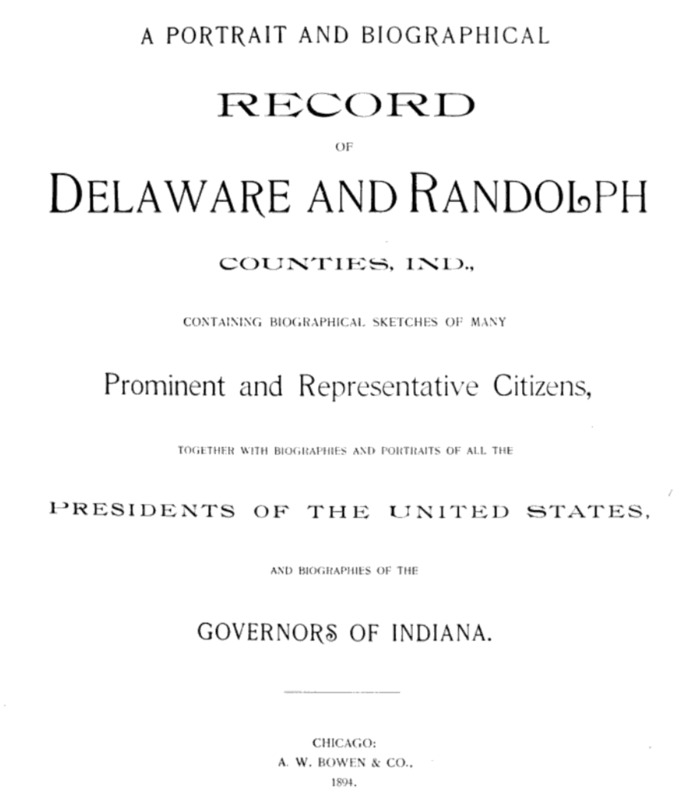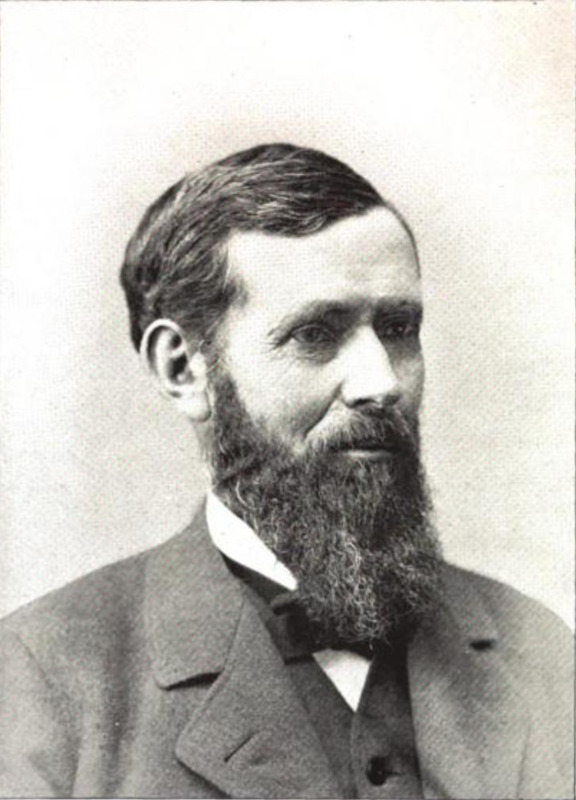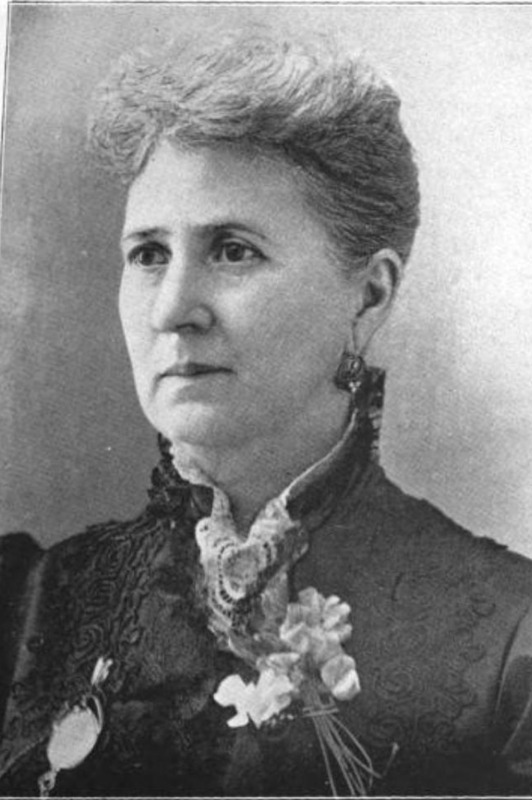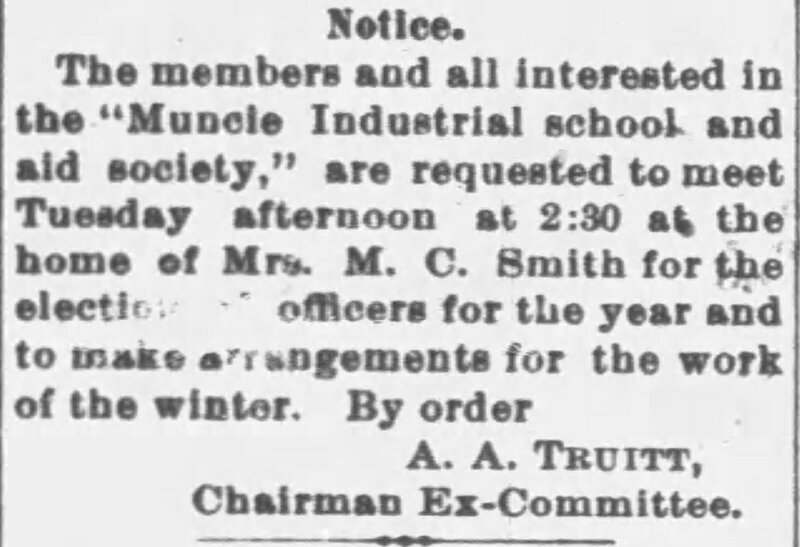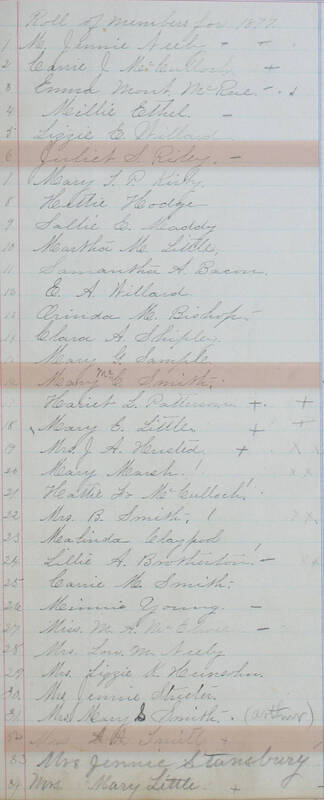Anna Augusta Truitt
In 1894 Anna Augusta Truitt appeared in A Portrait and Biographical Record of Delaware and Randolph Counties. Her biography describes her as intelligent, active, and benevolent, and married to a successful businessman. Since moving to Indiana in the 1860s, her volunteerism had bult a reputation for commitment to social reform and achievement. As this biography and many other sources show, her career is emblematic of the ways that married women from professional classes built "civic lives" in a period before they could vote.
This biography video was researched and created by Gavin Farmer, Ryan Flaherty, Lyric Garringer, and Leah Hembree.
Rarely do historians have an opportunity to see people in the past evaluated as they are in A Portrait and Biographical Record of Delaware and Randolph Counties. Although this collection of single-page biographies was a vanity project, designed to be sold to the very people that it profiled, it highlights achievements that contemporaries thought valuable and worth recording.
Of the 703 biographies of Delaware County citizens, only 21 (3%) were written about women. Thus Anna Truitt was part of a prestigious group of women, whose achievements might somehow be comparable to men's. Indeed, Anna Truitt's biography invites comparison by following directly after her husband, Joshua Truitt's biography. Whereas Joshua is described as "citizen and business man," Anna is described as "philanthropist and temperance worker." The practical-minded reader might conclude that Joshua's business success allowed Anna's volunteerism. That conclusion reminds us that the couple's wealth enabled their contributions to Muncie, as well as their appearance in this volume.
While Joshua's business occupies much of the biography, his participation in Muncie's literary societies is pointedly included. Noting that he presented "valuable, interesting and highly entertaining" papers at the Ethical [Society], Literary Friends, and Literary and Scientific Associal among other groups, provides a counter-balance to his commercial achievements. The reader also learns that Joshua's Christianity beliefs are closely held and firmly defended. While business comes first as one might expect, the biographer makes an effort to present him as a pleasant, intellectual, and Christian-minded man.
Unlike her husband, Anna's biography is chiefly occupied with descriptions of her charitable reform work, which are framed by an assertion that she was "eloquent, methodical and business like." These masculine characteristics suggest skill and education in a biography that otherwise describes "an apostle," "an advocate" and "an earnest and faithful worker" with a "benevolent mind." Anna appears to be led by her emotions into socially beneficial work. Although the work is appropriate for women, it succeeds chiefly because of her less passionate (or less feminine) characteristics.
Left: Joshua Truitt (1830-1890) from A Portrait and Biographical Record..., 478.
Anna's success overflows the volume's pages. Her volunteerism and committee work places her among the busiest unpaid women in Muncie. Like many other white Protestant women, Anna was a member of the Women's Christian Temperance Union (WCTU), which was founded to prohibit alcohol and improve women's physical safety and housheold economic resources. The WCTU was a national organization, founded in 1874 and headquartered in Illinois, that rapidly developed chapters in towns and cities across the United States. As the long-serving president of Delaware County's WCTU, Anna would have been known to many other women of a similar class and activity level.
Left: Anna Augusta Truitt (1837-1920) from A Portrait and Biographical Record..., 479.
Mary Caroline Smith (1834-1915) is a good example of this group of educated, professional class women, whose wealth and connections allowed them to create a local social safety net and sometimes influence legislation. Smith's husband was once mayor of Muncie (1869-1877) and afterwards a state senator, so she had a clear conduit to power. Like Anna, Mary Caroline was called "a leader in charity work and [who] at all seasons of the year she was ready to dispense charity where it was needed" (Muncie Morning Star, September 17, 1915). The two women collaborated in the running the Industrial School, which Mary Caroline and Juliet Riley founded in 1888. As the notice (left) shows, through the 1890s Anna appears as the Industrial School's chairwoman or secretary and Mary Caroline as its superintendant.
Both women had some secondary education and used their skills in ways that were useful to the community and that were also social and fashionable. In the 1870s onwards, across America women organized clubs for religious, intellectual, social, and charitable purposes. These groups appealed to women who did not have to work outside the home, were literate, and who could participate in daytime meetings. Interesting, there is substantial overlap between clubwomen and Muncie Public Library patrons. Anna Truitt and her peers were interested in the world outside their doors and had the intellectual and economic resources to effect change.
As the Women's Club Roll of Members from 1877 (left) shows, Anna Truitt joined Mary Caroline Smith and Juliet Riley in this new forum for would-be organizers. Founded in 1876 and meeting in living rooms across the city, the club became the central discussion group for women discussing cultural and social issues. As Felsenstein and Connolly remind us, groups like Muncie's Women's Club offered a space in which women had the opportunity "to read seriously, to make formal public presentations, and [...] to gain experience as organizers, speakers and critics."
What originated as a reading circle soon took on discussion of civic and social reform issues. In hindsight we can see how a group of women with education and resources, from professional families, would develop a variety of initiatives to assist local women and children. The names on the Roll of Members at left are a "who's who" of Muncie's professional elite. Jennie Neely was the daughter of Thomas Neely, the farrier, photographer, and diarist. Carrie McCulloch was the wife of a prominent physician and the mother of an important businessman who would give his name to McCulloch Park. She would go on to become the president of the city's Federated Club of Clubs, which spoke for all of Muncie's clubwomen. Emma Montgomery McRae was the principal of the high school, the wife of the superintendant of schools, and later the 'Lady Principal' at Purdue University. Millie Ethel's husband owned the Muncie Daily News. Harriet Patterson was Muncie Public Library's first librarian. Lizzie Heinsohn's family owned the Kirby House Hotel, which became a center for elite white sociability and hosted the Ball Brothers when they first arrived in Muncie.
Left: "Roll of Members for 1877," Women's Club of Muncie minutes, 1876-1886, p. 19, Ball State University Archives and Special Collections MSS.088, Ball State University, Muncie, IN.
Seeing Anna Truitt in this context, surrounded by other energetic women, whose education and wealth allowed them to do extraordinary things, shows the true impact of their privilege. Not only were they valued contributors to their community, but their contributions were recorded and maintained. Unlike Belle Kelley's Pekin Hotel, which hosted hundreds of guests but is hard to track, the meeting minutes of the Women's Club have been preserved from its inception in 1876 to 1992. In Truitt's case, race and class offered intersectional privileges that have preserved her legacy in substantial detail.
To hear more about the historian's process and the methodologies used to research and create historical narratives, check out the conversation between Gavin Farmer, Ryan Flaherty, Lyric Garringer, and Leah Hembree below.
Where Anna Augusta Truitt's biography praised her for having a "moral nature [that] is sweet and beautiful," there were few voices that described Grace Shoecraft Mabrey in similar tones. Anna's leadership in temperance and reform organizations contrasts dramatically with Grace's arrests for public intoxication and assault. Click on Grace Shoecraft Mabrey to learn more about the sort of households that the WCTU hoped to assist through the prohibition of alcohol.
